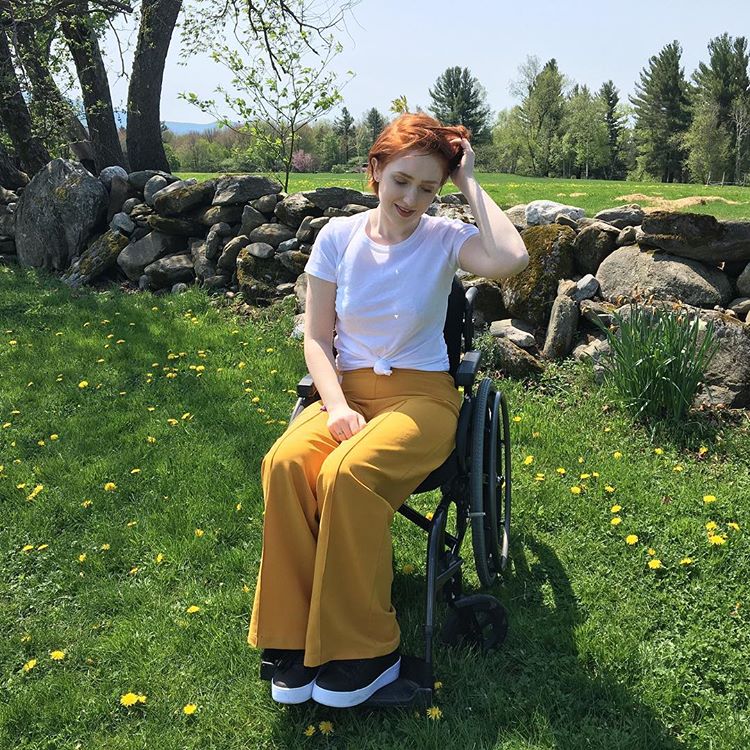I spent several years trying to be the best patient. If there was something medical that could help—even though it had awful side effects—I would give it a chance. Before I was finally diagnosed with mitochondrial disease, I spent my childhood years and high school career wondering what was wrong with me. It wasn’t just that I wondered about my body’s inconvenient quirks; I thought that everyone else was simply better at being a successful human. Throughout the long diagnostic process, I attempted to manage my symptoms by following the doctors’ directives to a “t.” At least I could be the perfect patient.
Physical therapists came to my home, I drove nine hours to see the “expert” in one of my other conditions, got in the car for a big road trip home right after a surgery, amassed a hefty handful of daily meds, completed high school from home, went to speech therapy for my funky vocal folds, and fought for clarity. I fought, and fought, and fought. While I got the answers that I’d been searching for in the end, they brought piercing clarity about future medical treatments. There’s no cure for mitochondrial disease. It’s progressive, impacts multiple organ systems, and no effective treatment exists. Everything is exhausting, and pushing my body too hard is scarily easy. The line where doing a bit too much turns into an extended, or permanent, setback is invisible and always shifting. If I continued to fight reality with the goal of being the perfect patient (on paper), no one would win. I certainly wouldn’t.
Looking back, I would still consent to most of the medical interventions that my doctors prescribed before we knew about my diagnosis. Others, maybe not. It doesn’t help me, or anyone else on my loving team, to dwell on the past. I believe that much can be learned through reflection, but the TARDIS won’t materialize to take me there. However, I feel that I know a little something about being the “perfect patient.” I know that striving to be perfect has a cost. In pursuing anything and everything that could possibly help me, I burned out. That’s when denial set in, and recovering from a period of denial over my illness’ trajectory brought more clarity than any appointment. Going forward, I need to ensure that most decisions benefit both my body and my soul. That’s a tall order, and it means being the imperfect patient sometimes.
Currently, I have enteral feeding tubes and a cardiac pacemaker. I used to have a PICC line for regular IV fluid infusions. Pain management is a constant challenge, and I can be too stoic for my own good. Other than that, I alternate between using a rolling walker and a wheelchair. My daily medications have been reduced to eliminate some side effects, but that will probably change soon. All of these things reflect my personal choices. They are necessary for maintaining (OK, pursuing) a certain level of function, but every “yes” is still my choice. Nothing is automatic, and positive changes aren’t guaranteed.
Since my feeding tube was switched from one single gastro-jejunal (GJ) tube to separate gastric and jejunal tubes in July, there’s been a considerable amount of pain around my new J-tube. Three months of antibiotics, and counting, haven’t solved the problem. Although it’s not as intense as the initial pain that sent me to the hospital in a ambulance, it’s still significant. My body tolerates slower and slower feed rates, and I’m at less than half of the original goal rate. There’s also the issue of the pain getting worse during the multiple hours-long continual feeds. All of that goes to say that I may face another difficult decision around the corner, and my choice may not please everyone.

In today’s world the valiant fighters are often crowned the “perfect patients” in disease communities, but I challenge that idea. I’m not fighting anymore. This patient seeks peace, with every fiber of my being. I choose to accept my body as it is, and I’ll keep trying to serve the world with love. Every medical decision will be carefully considered, not influenced by pressure to keep doing more. In a fight against my body, my body will win. I choose to make peace with it, and my uncertain future, because there are countless ways to use my precious energy for joy. If trying a little food by mouth brings me a bit of enjoyment, followed by discomfort, the trade-off may be worth the price sometimes. If using my wheelchair much more frequently means experiencing the wider world and meeting new people, then I’ll wheel around town. If the choice is between quality of time and quantity of time, then I choose quality. I say “yes” to being a strong individual, and making choices that fit within my personal values and desires.
Here’s the secret: there is no perfect patient! We can make the best choices for ourselves, and refrain from judging other people’s choices. I don’t think that actively fighting the symptoms of a chronic illness is the wrong choice, and I don’t believe that my approach is the best idea for everyone. Some illnesses can improve, some are tough but stay at a certain level of symptoms, and others get progressively worse over time. Mitochondrial disease presents differently in every patient, too. I believe we need to recognize the diversity of experiences and priorities among chronic and rare disease patients. Making medical decisions influenced by my own priorities has served me better than the perfect “yes” patient template. There’s endless uncertainty and gray area around me, but I know one important thing; there are no “good” patients or “bad” patients. Patients are people living their best possible lives, on their own terms.

